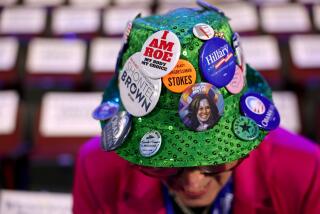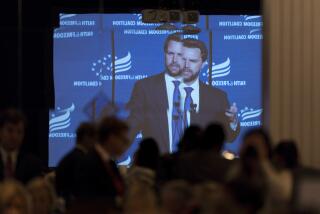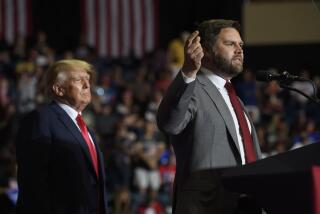AFL-CIO Sidesteps Debate on Abortion, Showing Schism on Issue Among Unions
- Share via
WASHINGTON — Although most national organizations long ago chose sides in the abortion debate that has been dominating America’s political scene, delegates to the AFL-CIO convention Thursday settled for a resolution promising to study the question of what side organized labor should support.
The compromise--engineered by pro-choice women who feared they would lose an outright confrontation--was an illustration of the schisms that exist in the AFL-CIO, which Thursday ended a week-long convention dedicated to proclaiming new-found levels of solidarity.
On one side of the abortion question were several major unions with heavy female membership. They wanted the 14-million-member labor federation to take a firm pro-choice stand, as virtually all of organized labor’s political allies have done.
On the other side was the AFL-CIO’s socially conservative executive council, populated largely by middle-aged white men. The 35-member executive council has only three women, although they make up a third of organized labor’s rank and file.
Organized labor has avoided the issue of abortion for years because it stands to alienate someone no matter which way it goes.
A pro-choice stance would be offensive to many of labor’s Catholic members, including millions of building trades members concentrated in the Northeast and the burgeoning Latino population that is regarded as a fertile source of future membership.
However, failure to adopt a pro-choice position would hamper labor’s stated goal of appealing to women in general. Women are a strong majority of the work force in areas like health care and the service sector, which labor needs to organize to make up for deep losses in the industrial sector.
Pro-choice forces throughout the nation began a furious lobbying campaign in July after the Supreme Court ruled that states could limit abortion rights. The resulting grass-roots campaign was credited with significantly helping Democratic candidates in last week’s elections, particularly in the Virginia governor’s race.
After July’s Supreme Court ruling, several unions submitted a half-dozen pro-choice resolutions to the AFL-CIO convention’s resolutions committee. The proposals joined a list of hundreds of other resolutions that are routinely, and usually quietly, taken up at the convention.
However, the resolutions committee, which includes the executive council and 17 other labor leaders, indicated it did not want to bring the pro-choice resolutions to the floor. It was clear a floor fight on abortion would be embarrassing, particularly at a convention whose official theme was “solidarity,” sources familiar with the conflict said.
So a deal was cut. The convention would merely call on the executive council to appoint a committee to fashion labor’s stand on abortion, hopefully by February for the next quarterly meeting of the executive council.
Several women who hold high positions in their unions privately said they were disappointed with the compromise but said it was necessary to avoid having the subject quashed entirely by the resolutions committee.
They will now lobby the executive council to draft a pro-choice stance that leans heavily on casting abortion as a civil rights issue, taking pains to acknowledge that there is room for disagreement.
“These are sensitive issues,” said Joyce Miller, a member of the executive council and a vice president of the 180,000-member Amalgamated Clothing and Textile Workers Union, in a convention speech in favor of the compromise. “We need time to build the coalitions that are necessary.”
Susan Cowell, a vice president of the 153,000-member International Ladies Garment Workers Union, stressed that she and other pro-choice delegates “did not choose this issue. . . . The Reagan court has forced it on us. . . . Labor cannot stand on the sidelines on the great issues.”
In tribute to how smoothly the compromise was orchestrated, all nine delegates who rose to speak on the abortion issue were pro-choice advocates, and eight of them supported the compromise, rather than an immediate vote.
The dissenter, Henry Nicholas, a member of the 1.1-million-member American Federation of State, County and Municipal Employees Union, said: “The entire labor movement must summon the moral courage to say yes . . . which side are we on? The labor movement must not wait on the moment.”
More to Read
Get the L.A. Times Politics newsletter
Deeply reported insights into legislation, politics and policy from Sacramento, Washington and beyond. In your inbox twice per week.
You may occasionally receive promotional content from the Los Angeles Times.










